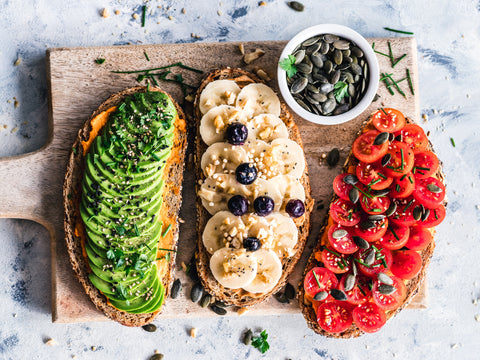Going Vegan? Here Is What Your Diet Might Be Missing.
It’s a common misconception that there’s no such thing as a healthy, well-rounded vegan diet; no, you won’t turn pale, skinny and sickly after chowing down on your first veggie burger! But, as with making any major diet change, you need to take a look at what’s on your plate to make sure your body is getting everything it needs.
So if you've watched The Game Changers documentary and want to give plant based living a try, here are five of the most important things to keep an eye on when going vegan…

B12
Vitamin B12 is used for many processes in the body, such as playing an important role within the central nervous system and supporting protein metabolism. Too little of this vitamin can lead to anaemia, infertility and heart disease. Vegetarians and vegans are at a high risk of being deficient, so be careful to eat plenty of unwashed organic produce (from B12-rich soils), mushrooms, nutritional yeast and other fortified foods such as alternative milks or cereals.
Complete Proteins
There are 9 essential amino acids that your body needs to get from food, and foods that contain all 9 are called complete proteins. Animal proteins tick all the boxes, but the full profile is less commonly found in plant-based sources - which is why it’s so important to combine different foods together. Go old school with classic pairings like rice and beans or hummus and pitta, or just grab a sachet or our vegan protein powder. We’ve specifically curated our blend using hemp & pea protein to make sure you’re getting a full amino acid profile, including lysine.
Omega 3’s
The essential omega-3 fat that our body cannot make is called alpha-linoleic acid (ALA), and it is beneficial for our immune system, brain and nerves. We all know about eating oily fish to get a boost of omega’s but eating enough of this on a plant-based diet can require a little more planning. Sources include chia seeds, hemp seeds, walnuts and rapeseed oils. You need to eat about 1 tablespoon of chia seeds or six walnut halves daily to hit your RDA, so pick up a plant-based supplement (made using algae), if you’re coming up short.
Iron
Think you need steak to get enough iron? That’s not necessarily true, but it is something to consider when eating a vegan diet. Iron is key to making new red blood cells and to carry oxygen around the body in your blood. Having too little can lead to anaemia, which gives symptoms such as fatigue and decreased immune function. Iron comes in two forms – heme and non-heme – and non-heme is the iron found in plants.
Unfortunately, this is harder to absorb than heme iron (found in animal products) so plant-based eaters will need a higher intake. Iron rich foods include cruciferous vegetables such as broccoli, beans, peas, nuts and seeds. Enriched cereals, breads and plant milks can help boost your intake.
Calcium
Another huge misconception is that we can only get enough calcium from drinking milk. There’s plenty of foods that contain a tonne of calcium without a drop of milk insight – kale, greens, chickpeas, tofu and plant milks too. Not only does this mineral keep your bones and teeth in good health, but it also plays a part in muscle function and heart health… pretty important stuff! A multi-vitamin or calcium supplements should be used if your RDA can’t be achieved through diet alone.
